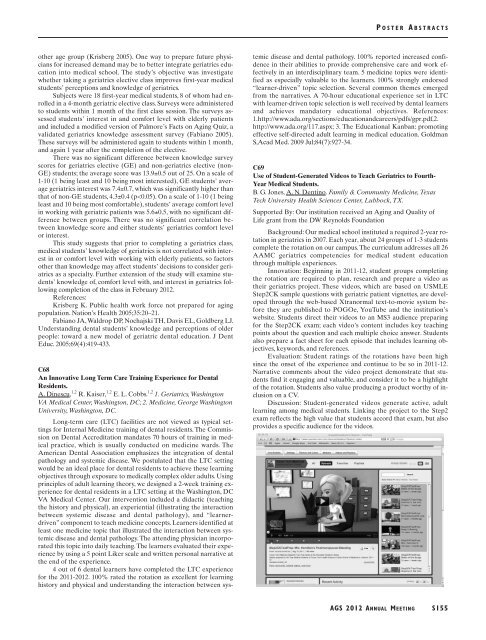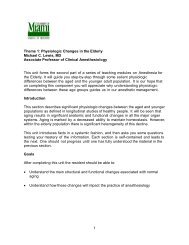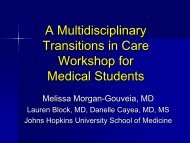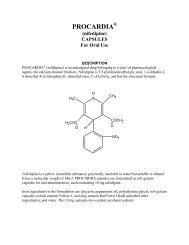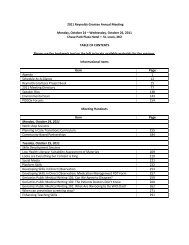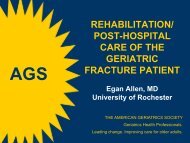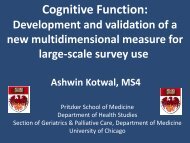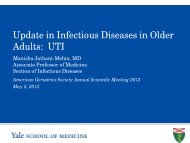- Page 1:
Dear Annual Meeting Attendee: The A
- Page 8 and 9:
P APER A BSTRACTS the National Deat
- Page 10 and 11:
P APER A BSTRACTS two counts were u
- Page 12 and 13:
P APER A BSTRACTS management in col
- Page 14 and 15:
P APER A BSTRACTS control collagen
- Page 16 and 17:
P APER A BSTRACTS creating a barrie
- Page 18 and 19:
P APER A BSTRACTS Conclusion: This
- Page 20 and 21:
P APER A BSTRACTS rates for CRs wer
- Page 22 and 23:
P APER A BSTRACTS each definition
- Page 24 and 25:
P OSTER A BSTRACTS been ruled out.
- Page 26 and 27:
P OSTER A BSTRACTS Discussion: Angi
- Page 28 and 29:
P OSTER A BSTRACTS calcitriol via 1
- Page 30 and 31:
P OSTER A BSTRACTS ii J Clin Micrbi
- Page 32 and 33:
P OSTER A BSTRACTS is on the rise.
- Page 34 and 35:
P OSTER A BSTRACTS edema (60%), and
- Page 36 and 37:
P OSTER A BSTRACTS categories based
- Page 38 and 39:
P OSTER A BSTRACTS Methods: A longi
- Page 40 and 41:
P OSTER A BSTRACTS Design. CaMos is
- Page 42 and 43:
P OSTER A BSTRACTS incidents (64%)
- Page 44 and 45:
P OSTER A BSTRACTS TNF-R1 levels we
- Page 46 and 47:
P OSTER A BSTRACTS curriculum betwe
- Page 48 and 49:
P OSTER A BSTRACTS A75 Geriatrics a
- Page 50 and 51:
P OSTER A BSTRACTS Design: Based on
- Page 52 and 53:
P OSTER A BSTRACTS medicine fellows
- Page 54 and 55:
P OSTER A BSTRACTS While we were no
- Page 56 and 57:
P OSTER A BSTRACTS and knowledge pr
- Page 58 and 59:
P OSTER A BSTRACTS made more eye co
- Page 60 and 61:
P OSTER A BSTRACTS This study’s p
- Page 62 and 63:
P OSTER A BSTRACTS that a substanti
- Page 64 and 65:
P OSTER A BSTRACTS articulate goals
- Page 66 and 67:
P OSTER A BSTRACTS transitions invo
- Page 68 and 69:
P OSTER A BSTRACTS findings suggest
- Page 70 and 71:
P OSTER A BSTRACTS and its sum of b
- Page 72 and 73:
P OSTER A BSTRACTS NTM infection wa
- Page 74 and 75:
P OSTER A BSTRACTS death because
- Page 76 and 77:
P OSTER A BSTRACTS A158 Curved Path
- Page 78 and 79:
P OSTER A BSTRACTS compared to pati
- Page 80 and 81:
P OSTER A BSTRACTS Methods: We are
- Page 82 and 83:
P OSTER A BSTRACTS with only about
- Page 84 and 85:
P OSTER A BSTRACTS with typical ris
- Page 86 and 87:
P OSTER A BSTRACTS The aim of this
- Page 88 and 89:
P OSTER A BSTRACTS B27 Shared Decis
- Page 90 and 91:
P OSTER A BSTRACTS SES, adiposity a
- Page 92 and 93:
P OSTER A BSTRACTS care (OR 1.93, 9
- Page 94 and 95:
P OSTER A BSTRACTS Conclusion: Agin
- Page 96 and 97:
P OSTER A BSTRACTS B49 Prevalence a
- Page 98 and 99:
P OSTER A BSTRACTS Conclusions: The
- Page 100 and 101:
P OSTER A BSTRACTS B61 Losartan inc
- Page 102 and 103:
P OSTER A BSTRACTS Conclusions Our
- Page 104 and 105:
P OSTER A BSTRACTS Significant incr
- Page 106 and 107:
P OSTER A BSTRACTS frailty have inc
- Page 108 and 109:
P OSTER A BSTRACTS Conclusion: In t
- Page 110 and 111: P OSTER A BSTRACTS BMI=28.4, mean P
- Page 112 and 113: P OSTER A BSTRACTS Each subject’s
- Page 114 and 115: P OSTER A BSTRACTS There is growing
- Page 116 and 117: P OSTER A BSTRACTS variation in uti
- Page 118 and 119: P OSTER A BSTRACTS complex elders s
- Page 120 and 121: P OSTER A BSTRACTS satisfaction wit
- Page 122 and 123: P OSTER A BSTRACTS Methods: The Hon
- Page 124 and 125: P OSTER A BSTRACTS B130 Early Disco
- Page 126 and 127: P OSTER A BSTRACTS IgE antibodies i
- Page 128 and 129: P OSTER A BSTRACTS contribution by
- Page 130 and 131: P OSTER A BSTRACTS The oldest old (
- Page 132 and 133: P OSTER A BSTRACTS B153 Encore Pres
- Page 134 and 135: P OSTER A BSTRACTS B159 Accuracy of
- Page 136 and 137: P OSTER A BSTRACTS GDS and GDS apat
- Page 138 and 139: P OSTER A BSTRACTS status, procedur
- Page 140 and 141: P OSTER A BSTRACTS In this case it
- Page 142 and 143: P OSTER A BSTRACTS the episodes of
- Page 144 and 145: P OSTER A BSTRACTS paralysis is see
- Page 146 and 147: P OSTER A BSTRACTS grip strength ch
- Page 148 and 149: P OSTER A BSTRACTS Discussion/Concl
- Page 150 and 151: P OSTER A BSTRACTS Results: Of 1401
- Page 152 and 153: P OSTER A BSTRACTS Results: Regiona
- Page 154 and 155: P OSTER A BSTRACTS Conclusions: Con
- Page 156 and 157: P OSTER A BSTRACTS 2.47-25.96), and
- Page 158 and 159: P OSTER A BSTRACTS Methods: EMR ACP
- Page 162 and 163: P OSTER A BSTRACTS C71 Outpatient A
- Page 164 and 165: P OSTER A BSTRACTS IPE are generall
- Page 166 and 167: P OSTER A BSTRACTS the outpatient s
- Page 168 and 169: P OSTER A BSTRACTS 0.03). Age and s
- Page 170 and 171: P OSTER A BSTRACTS C94 Exploring th
- Page 172 and 173: P OSTER A BSTRACTS with the least e
- Page 174 and 175: P OSTER A BSTRACTS physician resist
- Page 176 and 177: P OSTER A BSTRACTS Table 1. Effect
- Page 178 and 179: P OSTER A BSTRACTS C118 Patient and
- Page 180 and 181: P OSTER A BSTRACTS We monitor the t
- Page 182 and 183: P OSTER A BSTRACTS PROGRAM STRUCTUR
- Page 184 and 185: P OSTER A BSTRACTS C135 Encore Pres
- Page 186 and 187: P OSTER A BSTRACTS C141 Contributio
- Page 188 and 189: P OSTER A BSTRACTS nal process can
- Page 190 and 191: P OSTER A BSTRACTS project, we atte
- Page 192 and 193: P OSTER A BSTRACTS Methods: Two hun
- Page 194 and 195: P OSTER A BSTRACTS Case: A 78 year-
- Page 196 and 197: P OSTER A BSTRACTS two synergistic
- Page 198 and 199: P OSTER A BSTRACTS then awoke spont
- Page 200 and 201: P OSTER A BSTRACTS cancer, non mali
- Page 202 and 203: P OSTER A BSTRACTS The diagnosis of
- Page 204 and 205: P OSTER A BSTRACTS D32 Comparison o
- Page 206 and 207: P OSTER A BSTRACTS D38 The burden o
- Page 208 and 209: P OSTER A BSTRACTS rate was 21.9% f
- Page 210 and 211:
P OSTER A BSTRACTS D50 A Pilot Stud
- Page 212 and 213:
P OSTER A BSTRACTS of the education
- Page 214 and 215:
P OSTER A BSTRACTS and geriatrics c
- Page 216 and 217:
P OSTER A BSTRACTS Care Surgery, Em
- Page 218 and 219:
P OSTER A BSTRACTS survey using the
- Page 220 and 221:
P OSTER A BSTRACTS & Go Test, and T
- Page 222 and 223:
P OSTER A BSTRACTS binge drinking d
- Page 224 and 225:
P OSTER A BSTRACTS The percentages
- Page 226 and 227:
P OSTER A BSTRACTS other forms of t
- Page 228 and 229:
P OSTER A BSTRACTS D102 Clinician
- Page 230 and 231:
P OSTER A BSTRACTS this result repr
- Page 232 and 233:
P OSTER A BSTRACTS D114 Fall Reduct
- Page 234 and 235:
P OSTER A BSTRACTS D120 Geropsychia
- Page 236 and 237:
P OSTER A BSTRACTS In addition to 7
- Page 238 and 239:
P OSTER A BSTRACTS D132 Encore Pres
- Page 240 and 241:
P OSTER A BSTRACTS Conclusions: The
- Page 242 and 243:
P OSTER A BSTRACTS D144 The Use of
- Page 244 and 245:
P OSTER A BSTRACTS Methods: Cross-s
- Page 246 and 247:
P OSTER A BSTRACTS CONCLUSIONS: The
- Page 248 and 249:
P OSTER A BSTRACTS Aggressive treat
- Page 250 and 251:
A UTHOR I NDEX Azhar, G . . . . . .
- Page 252 and 253:
A UTHOR I NDEX Ceimo, J . . . . . .
- Page 254 and 255:
A UTHOR I NDEX Dunn, C M . . . . .
- Page 256 and 257:
A UTHOR I NDEX Griebling, T L . . .
- Page 258 and 259:
A UTHOR I NDEX Johnson, K . . . . .
- Page 260 and 261:
A UTHOR I NDEX Levine, M . . . . .
- Page 262 and 263:
A UTHOR I NDEX Mulsant, B . . . . .
- Page 264 and 265:
A UTHOR I NDEX Pschirer, J P . . .
- Page 266 and 267:
A UTHOR I NDEX Sheppard, K D . . .
- Page 268 and 269:
A UTHOR I NDEX Ukritchon, S . . . .
- Page 270 and 271:
K EYWORD 25-hydroxyvitamin D . . .
- Page 272 and 273:
K EYWORD I NDEX Colorectal cancer s
- Page 274 and 275:
K EYWORD I NDEX Geriatric curriculu
- Page 276 and 277:
K EYWORD I NDEX Medication discrepa
- Page 278 and 279:
K EYWORD I NDEX Race . . . . . . .
- Page 280:
This page intentionally left blank


